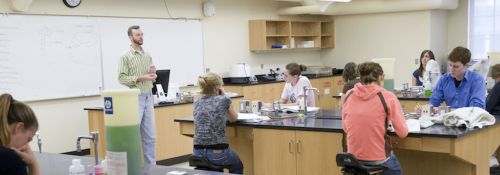
A Glimpse of Biology with Dr. David Houghton
Dr. David Houghton, Associate Professor of Biology at Hillsdale College, was raised in Minnesota. He attended the University of Wisconsin-Stevens Point, where he majored in Limnology and studied the effects of invasive crayfish on aquatic insect populations. After completing a Master’s Degree at the University of North Texas, he received his PhD from the University of Minnesota. Before he began teaching at Hillsdale College in 2005, Houghton taught biology at Lynchburg College in Virginia. Houghton currently lives in Hillsdale with his wife, Rebecca, who teaches French at Hillsdale Academy.
* * *
What brought you to Hillsdale?
I wanted to be at a really good liberal arts college; that’s been my goal since I was a teenager. The school made an offer, and I’ve been here eight years now, teaching and directing science and research up at our biological station.
What are your research interests?
Recently, I’ve been working a lot on my book Biological Diversity of the Minnesota Caddisflies (Insect Trichoptera). It’s more of a technical manual than a book, a summary of research that has been going on for a couple of years. We’re essentially cataloguing the aquatic insect diversity of Minnesota, which was a project begun a few years ago. We sampled from well over 100 localities throughout the state and actually we have the largest database of insects in the north central U.S. right here, not at University of Michigan, not Michigan State, but here, at Hillsdale College. We’re also working on a project involving DNA barcoding all the specimens we have and all the pieces up at our biological station. My students and I also are doing a bunch of work on the thermal tolerance of aquatic ecology. The students and I have published at least half a dozen papers in the last year; we’re as productive as anybody!
Why do you like teaching at Hillsdale?
It’s a lot more fun and satisfying to teach when students are motivated and care. And Hillsdale students as a rule are pretty dedicated, serious people, particularly the upper level students who really want to get into topics. I also like that we have so many resources here—most noticeably our biological station—but also down here on campus we have gene sequencers and all this equipment you typically find only at larger schools. And unlike at larger schools, our students actually get to use everything. I think we are the best of both worlds.
What is one of your favorite stories about your students?
The one that stands out is about one of my students who was an English major, of all things. She was interested in biology and so she took my summer ecology course. And this is an English major—she’s terrified of math, terrified of all this science stuff. About halfway through the first week of classes, she told me she wanted to quit. She knew she was just going to get an F. I told her, “You can’t quit!” And she stayed and ended up getting an A. She got so fired up about it that she asked if she could do a research project, did it, and got it published in The Scientific Literature Review. An English major published in Scientific Literature! And as you probably know, trying to get a job teaching English is really hard. Well, she got a job teaching biology. She ended up graduating with a bio minor and getting hired over applicants who had master’s degrees in biology because she was published and had so much field experience. I totally converted her to the dark side!
But this is indicative of two things: first, we have such good resources at the biology station that several undergrads per year can publish papers in Scientific Literature. You don’t find that at most small schools. Second, I think it demonstrates the kind of students we have, that even an English major here is smart enough and well-versed enough that she can learn biology and be really successful with it.
What do you appreciate most about the students here?
They’re serious. I get the sense that you don’t get a lot of students here just going through the motions. There are some schools where that is not true, and this ain’t one of them: if you’re here, you’re serious about being here. That doesn’t mean you can’t have fun and enjoy yourself, but you take your studies seriously. I find it very rare that someone truly has zero interest here at Hillsdale. You come here because you want to be an intelligent, well-versed person in the world. I think that’s really cool.
What are you looking forward to in the coming year?
Without question, the highlight of every year for me is the first six weeks of summer, because that’s when I teach my field ecology class and do research up at the bio station. That’s when our little liberal arts college really transforms into a serious research institution. I really don’t think a lot of people realize the quality of work that we do up there; I would put our research program up against almost any big school because we have both a dedicated facility and very dedicated students.
The students who come are 20 years old and have never had hands on experience before; they’ve only had science spoon-fed to them in the classroom. So to see the transformation from a timid little undergraduate who learns what he’s supposed to learn and spits it back to the teacher on an exam to “Wait a minute, I’m discovering something new!” is phenomenal. By the end of the summer, I have young scientists who know more about a topic than anyone on the planet. It’s a very narrow topic, albeit, but they know it better than anybody else, and they have done true, original, unique research. The confidence with which they carry themselves as a result is profound.